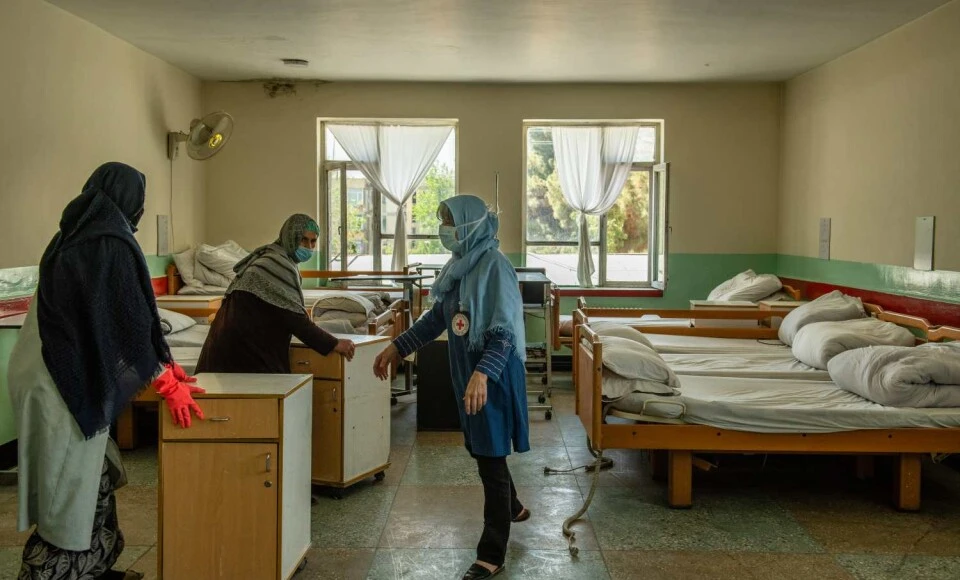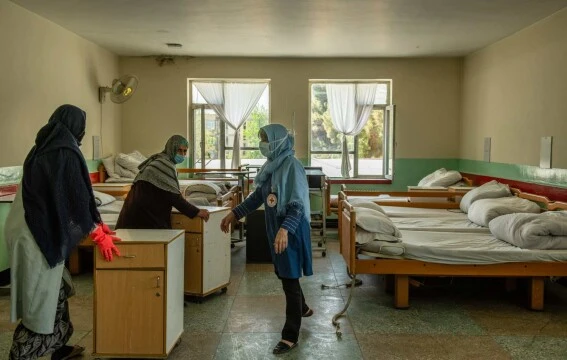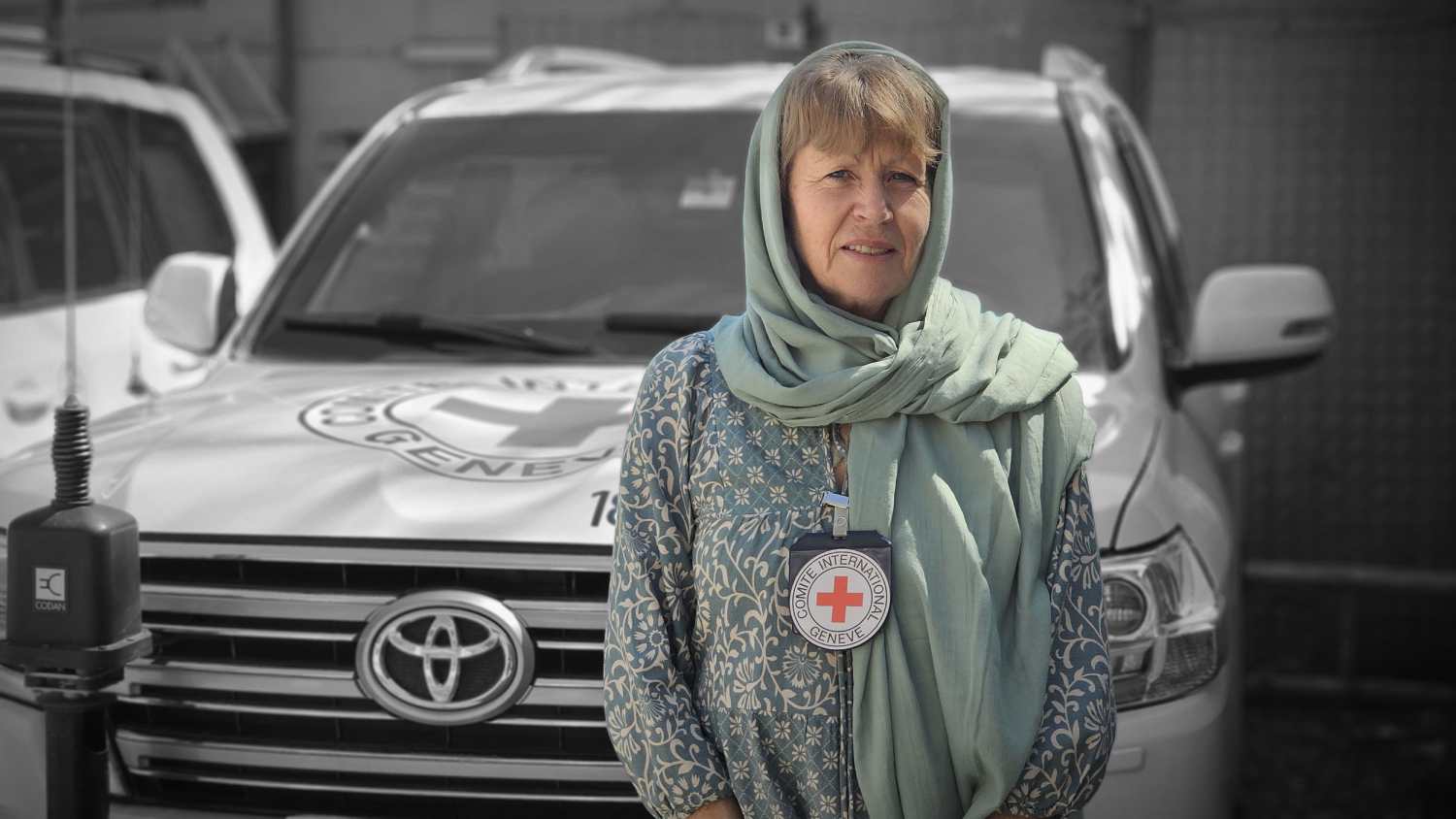Life in Afghanistan as a health programme coordinator
2 July 2024


International delegate Gail Corbett just managed to get her home heating fixed in Horowhenua in time before returning to Kabul in Afghanistan.
Seeing friends, getting jobs like plumbing repairs done, and a bit of gardening filled up her recent two weeks' leave.
It’s her fourth stint in Afghanistan, this time as health programme coordinator. This 18-month contract is with the International Committee of the Red Cross (ICRC).
Gail is a nurse and nurse educator with specialist training in midwifery and neonatal care. She’s been an international delegate since 2010.
“Becoming a delegate has been a different way to take my nursing experience further. I’d been doing neo-natal nursing and education for a long time and this was quite different, but still nursing.”
Health coordination in Afghanistan
In Afghanistan, Gail manages a team of 36 national and international staff. She also coordinates healthcare planning and budgeting for ICRC’s work in the country. “It’s trying to be strategic – thinking of needs, and also our capacity to deliver.”
“I’m passionate about nursing. It’s one of the best ways to be useful. This is a good way to see the real world and use the skills that I have,” she says.
The health needs in Afghanistan are immense. Geography and politics make the distribution of healthcare challenging. After the change in authorities, the health care system which had relied heavily on funds from various international donors and humanitarian agencies, was severely impacted when funding stopped. Now a parallel system alongside the regime is being coordinated by the World Health Organisation and UNICEF. Consequently, Gail’s work includes liaison with these agencies and the Ministry of Public Health.
The activities she oversees include the capacity building of health staff, supply of medicines at the primary health care clinics around the country, and preparation for disaster response. As part of ICRC, she works closely and alongside Afghan Red Crescent Society supporting their primary health centres. Other work the health team does includes: health care for people in detention at clinics in provincial prisons, first aid training for first responders, education on emergency trauma care for hospital staff, and preparedness for disease outbreaks or natural disasters.
This year the ICRC health programme is supporting the ongoing training of students for midwifery, nursing and technicians such as lab and x-ray staff, at the Institute of Health Sciences.
“As coordinator, I am part of a multidisciplinary team promoting respect for the medical mission, - also known as health care in danger, - this involves considering prevention, security, and protection of health services and staff in collaboration with the Health Authorities.
ICRC monitor for incidents and where relevant discusses confidentially with authorities to affect a change. Education by ICRC health staff and other ICRC colleagues working with security forces, clarifies roles and responsibilities, and how to respond to certain situations such as explaining why operating theatres are off limits to anyone carrying guns.
Gail says while the needs are great, ICRC focus is on activities that will have a sustainable impact. For example, the training of trainers for trauma care and first aid.
Many people are well motivated and make the most of this training. “Some of the emergency room doctors and nurses have missed valuable education opportunities, and these emergency trauma courses provide them with essential skills that are lifesaving. In New Zealand, it is easy to take such courses as a right or just part of an annual update – but for these individuals, it enables them to make a difference in how they work and how in turn they pass on that knowledge. We do see this thirst for knowledge, it’s soaked up like water in a sponge,” explains Gail.
There is a long history of strong nursing and midwifery training in Afghanistan. “I am pleased the Health Authority has continued to ensure female nurses and midwives are trained, and employed in public and private health facilities, especially in maternity care. Between 30 to 40 percent of graduates from the health institutes are female nurses.”

International Delegate Gail Corbett in Kabul, Afghanistan
Life as a delegate
Gail’s 12 deployments with New Zealand Red Cross and ICRC have also taken her to Egypt, Gaza, Iraq, Syria, Somalia, Sudan and Yemen.
In Afghanistan, it is compound life. She is among around 18 other delegates who rotate in and out of the country and to Kandahar, Herat and Mazar i Sharif. “My life is work-based. When I do have free time, I go to the gym, play volleyball and practice yoga – all good for keeping the body and mind ticking over.”
Gail has regular breaks every eight to 10 weeks out of the country, sometimes to Brisbane to see her children and, less frequently, home to Aotearoa New Zealand.
She’s used to adapting to different cultures from her varied delegate deployments, and to living a life focused on work for intense periods, but she says extended breaks are also needed. “Last year I had six months off and all I did was work in the garden. It does take a while to switch off. I didn’t need to think about anything or report to anyone. It was a good break.”
Gail has completed 10 months of her deployment with ICRC. As one of our New Zealand Red Cross international delegates, she’s trained in emergency management and disaster response and security. All our delegates have wide-ranging critical technical knowledge and skills needed to complement the local humanitarian response and work in challenging emergency environments.
Currently, we have seven international delegates deployed in the Pacific either working directly to progress our support to National Societies such as financial organisation and or to the International Federation of the Red Cross and Red Crescent Societies (IFRC) to support programmes such as cyclone recovery in Vanuatu and Tonga, and climate resilience across the Pacific.
We have recently recruited another 18 delegates who’ve successfully completed our IMPACT and Security training to prepare them for deployment.
More information
Our specialist international delegates
Our international delegates are ready to go to emergencies or disasters within 72 hours of a call. We have over 100 specialist international delegates from healthcare coordinators to operation Telecommunications specialists.
Learn more about becoming an international delegate:
Our International Delegate Programme
Find missing family
Our Restoring Family Links team is on standby to receive enquiries from people living in Aotearoa New Zealand who have lost contact with loved ones due to the disaster.
Donate to support our work
You can still donate to our Where the Need is Greatest Fund. Donations to this Fund support all our humanitarian work and help us respond to disasters and crises, wherever the need is greatest.
Give hope to people in need, donate to Where the Need is Greatest
Lead image: Helping set up the COVID-19 response in the Afghan Red Crescent Society’s hospital in Kabul, March 2020.
